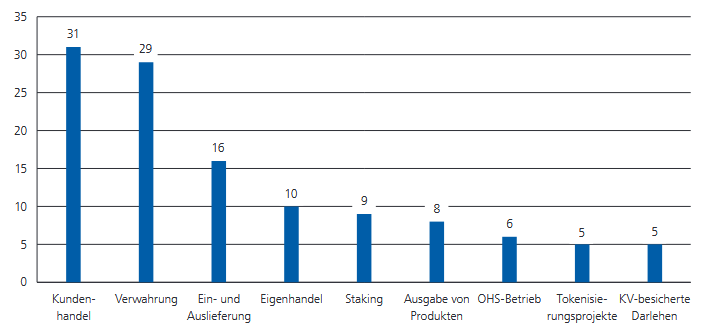Die Eidgenössische Finanzmarktaufsicht (FINMA) ist eine unabhängige Aufsichtsbehörde mit einem gesetzlichen Auftrag zur Überwachung der Finanzmärkte. Seit 2013 setzt sich die Behörde für technologieneutrale Krypto-Regulierung ein. Über die Jahre wuchs allerdings Kritik an der FINMA - sie ruhe sich auf ihren Lorbeeren aus.
Anlässlich ihrer Jahresmedienkonferenz veröffentlichte die FINMA heute ihren Geschäftsbericht für das Jahr 2023. Wie erwartet legt die Behörde ihren Fokus auf die Übernahme der Credit Suisse durch die UBS. Krypto-Assets widmet die FINMA rund vier von 128 Seiten. Thematisiert wird Staking, das neue Meldesystem für Krypto-Assets, eine kritische Betrachtung von Decentralized Finance (DeFi) und das erste Gesuch für ein DLT-Handelssystem.
Digitalisierung im Finanzbereich
Laut dem Jahresbericht bearbeitete die FINMA 2023 zahlreiche Praxisfragen im Bereich der Krypto-Vermögenswerte. Sie habe entscheidend für die Einhaltung des geltenden Rechts zum Schutz der Finanzkunden gesorgt. Denn, so die FINMA, das Interesse an Krypto-Assets bleibt sowohl bei neuen Marktteilnehmern als auch bei etablierten Finanzinstituten hoch. Im Zentrum haben 2023 die Themen Handel und Verwahrung von Kryptowährungen ("Zahlungs-Token") sowie Staking gestanden. Letzteres bezieht sich auf das Hinterlegen von Krypto-Assets zur Sicherung eines Proof-of-Stake-Netzwerks, das in der Regel mit einer Rendite entlöhnt wird.
Ebenfalls reichte der erste Antragsteller ein Gesuch für ein DLT-basiertes Handelssystem ein und die FINMA habe sich aktiv ins Regulierungsprojekt zur Nachfolge der Fintech-Bewilligung eingebracht. Schliesslich gingen 2023 rund 100 Fintech-Unterstellungsanfragen bei der Behörde ein. Dies entspricht ungefähr der Anzahl des Vorjahres. Zwar seien diese Projekte inhaltlich sehr unterschiedlich einzuschätzen. Die meisten hätten aber Bezüge zu den Trends Decentralized Finance (DeFi), Tokenisierung von Vermögenswerten oder die Nutzung von tokenisierten Gegenständen in einem Metaversum aufgewiesen.
Schweizer Banken positionieren sich allmählich
Die Anzahl FINMA-beaufsichtigten Banken und Wertpapierhäuser, die Krypto-Dienstleistungen anbieten, nahm gegenüber dem Jahr davor von 30 auf 34 zu. Insgesamt gibt es in der Schweiz 278 solche Institute. Erst 12.2% der Finanzhäuser sind also positioniert. Die FINMA habe in diesem Zusammenhang verschiedene Fragestellungen unter Berücksichtigung der Risiken bei den dynamischen Entwicklungen in diesem Bereich bearbeitet. Laut den Angaben unter dem im Februar 2023 eingeführten Krypto-Meldewesen verwahrten Schweizer Banken etwa 6 Milliarden Franken an digitalen Assets. Der Grossteil davon waren Kundenbestände und nur 0.7 Mrd. CHF Eigenbestände.
Unter den vier neuen Banken mit Krypto-Angeboten befanden sich zwei Kantonalbanken - die Zuger und St. Galler. Die Dienstleistungen der Luzerner Kantonalbank und PostFinance erfolgte nicht mehr im Berichtsjahr. Die meisten der untersuchten Institute wickeln ihre Krypto-Dienstleistungen ausserdem über Drittparteien ab. Im Fokus liegen primär Krypto-Handel und die Verwahrung.

FINMA gerät in Kritik bei Staking und Travel Rule
Nicht alles lief 2023 einwandfrei. Wie der Jahresbericht richtig ausführt, gewann die Staking-Thematik aufgrund der Umstellung Ethereums auf Proof-of-Stake ("Merge") zunehmend an Bedeutung. Im Zuge dieses Trends veröffentlichte die FINMA im September 2023 ihre neue Staking-Praxis. Dienstleister bräuchten künftig eine Banklizenz. Dies begründete die Aufsichtsbehörde mit dem 2021 eingeführten DLT-Gesetz. Der Aufschrei der Branche war laut. Die beiden Verbände Swiss Blockchain Federation (SBF) und die Crypto Valley Association (CVA) schlugen sofort Alarm. Es handle sich um eine Fehlinterpretation der DLT-Vorlage, die drastische Folgen für Krypto-Dienstleister hätte. Nur wenige der Staking-Anbieter verfügen über eine Banklizenz. Noch vor Jahresende lenkte die FINMA schliesslich ein.
Ebenfalls auf Kritik stiess die 2022 vollzogene Revision des Geldwäschereigesetzes. Zuvor konnten Schweizer Krypto-Broker Kryptowährungen ohne umfassende Know Your Customer (KYC)-Prüfung an die Wallets ihrer Kunden übertragen, solange der Wert pro Transaktion weniger als 5'000 Franken betrug. Derselbe Schwellenwert gilt für Geldwechselgeschäfte. Neu sollte die Schwelle für Krypto-Transaktionen bei 1'000 Franken liegen. In einer Teilrevision vom Mai 2022 zog die FINMA die Schraube noch enger. Jetzt sind es 1'000 Franken pro Monat. 2023 reichte der Westschweizer Krypto-Dienstleister Bity deshalb Beschwerde gegen die FINMA ein. Die Änderungen hätten gegen die Ziele des Bundesrates verstossen und seien unter Verletzung mehrerer Artikel des Finanzmarktaufsichtsgesetzes (FINMAG) erlassen worden.
Auf Anfrage von CVJ.CH rief Mitgründer Alexis Roussel erneut dazu auf, sich gegen die gefährliche Richtungsänderung der FINMA zu wehren. Wenn die Aufsichtsbehörde ihre Position nicht schnell ändere, verspiele sich die Schweiz ihren Wettbewerbsvorteil. Die Schweizer Krypto-Industrie werde nicht in der Lage sein, echte Krypto-Dienstleistungen im Rahmen von nicht-verwahrenden Geschäftsmodellen (engl. = non-custodial) zu entwickeln.
"Seit dem Abgang von Mark Branson hat die FINMA in Bezug auf die Krypto-Industrie eine klare Führungsschwäche an den Tag gelegt. Dies führte zu einer Reihe von willkürlichen Entscheidungen, die eine eindeutige Diskriminierung der Krypto-Branche darstellen. Wir müssen diese durch intensive Lobbyarbeit bekämpfen, wie z.B. bei der Entscheidung über das Staking oder vor den Gerichten bezüglich der Anwendung von Geldwäschebestimmungen (AML) bei Krypto-Transaktionen." - Alexis Roussel, Mitgründer Bity








